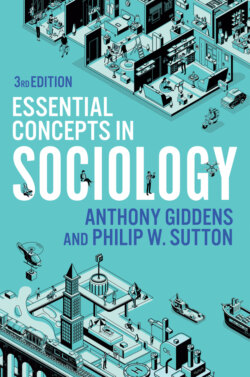Читать книгу Essential Concepts in Sociology - Anthony Giddens - Страница 38
Meaning and Interpretation
ОглавлениеBecause Weber’s rationalization thesis has been so influential in sociology, we will concentrate on this rather than on philosophical arguments around reason and rationalism. Rationalization is a process of change, beginning in the West, during which more and more aspects of social life come to be shaped by means-to-ends calculations and matters of efficiency. This is in stark contrast to earlier periods, in which traditional practices, customary actions and emotional commitments dominated people’s thoughts and actions. Weber saw rationalization becoming cemented by the development of capitalist economics and its need for rational accounting and measurement, but also by the growth of scientific institutions promoting a rational outlook and by bureaucracy, which became the dominant, most efficient form of organization.
Weber discussed rationality in terms of four basic types: practical, theoretical, substantive and formal (Kalberg 1985). Practical rationality is in evidence where people generally accept the situation and their actions are guided by essentially pragmatic considerations of how they can make the most of it. Theoretical rationality exists where people try to ‘master reality’ by thinking through their experience and finding a meaning in life. Philosophers, religious leaders, political theorists and legal thinkers may be seen as adopting forms of theoretical rationality. Substantive rationality directs actions according to a cluster of values in a particular sphere of social life. For instance, friendship relations tend to involve the values of mutual respect, loyalty and assistance, and this value cluster directly frames people’s actions in this area of life.
Weber’s fourth type, formal rationality, is based on the calculation of the most effective means to achieve a specific goal in the context of a set of general or universal laws or rules. The rationalization of Western societies involves the growth and spread of formal rationality and calculation into more and more spheres of life as bureaucracy becomes the most widely adopted form of organization. Economic decisions are the paradigmatic form, though means–end calculations have become commonplace in many other areas of life too. Rationalized Western music, for example, uses a universal system of notation and measurement of rhythmic and tonal differences and is codified and written down, allowing the compositions of the towering geniuses to be performed by anyone who can read sheet music and play an instrument. Music has become rule-governed, calculable and predictable but less spontaneous and flexible.
As capitalism expanded along with state bureaucracies, formal rationality gradually became embedded in the major institutions of society, edging out other forms. Weber was quite clear that this process was likely to be permanent, as the impersonal, bureaucratic form of administration that was adopted throughout office environments, workplaces and state departments was simply the most efficient method of organization yet devised. By squeezing out all personal favours and emotional connections, bureaucracies ensure that the best-qualified people are appointed to each position and that career promotions are based on demonstrated evidence of competence and performance in the role. Remember, this is an ideal type. Similarly, the basic double-entry book-keeping associated with capitalist profit-making (recording credits and debits) produces a calculative mentality which encourages instrumentally rational action, and, as capitalist firms become ever larger and more geographically dispersed, an efficient administration becomes ever more important.
Although he saw the growth of this form of rationalization as inevitable, Weber also saw some clear dangers. The pursuit of efficiency and technical progress begins to produce a society that becomes increasingly impersonal, seeming like an external force that controls our destiny. In Weber’s thesis, society turns into a ‘steel-hard cage’ from which there is no prospect of escape. A further consequence is that there is a tendency for the means to dominate over the ends. That is, bureaucracies are a means to achieving other ends, such as an efficient civil service, a well-ordered health service or an efficient welfare benefits system. But over time, as its power grows, the bureaucracy takes on a life of its own, so that, rather than being the servant to other ends, it becomes the master. Weber saw this as a process of rationalization towards irrational outcomes which can be observed in many areas of society.
